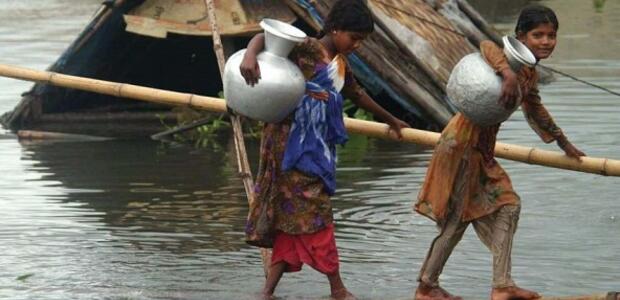Background Note
Artificial intelligence versus COVID-19 in developing countries
In this note, I will refer to current efforts to harness artificial intelligence (AI) in the push back against COVID-19, note its promises, limitations, potential pitfalls, and identify priorities for developing countries. Artificial Intelligence is...
Working Paper
Gender and vulnerable employment in the developing world
This paper investigates gender inequality in vulnerable employment: forms of employment typically featuring high precariousness, inadequate earnings, and lack of decent working conditions. Using a large collection of harmonized household surveys from...
Blog
Looking ahead to COP26
The long-awaited COP26 in Glasgow is about to start. Billed as the most important COP to date, it is widely seen as a last chance to avoid a global...
Blog
Reducing wasted gas emissions is an opportunity for clean air and climate
by
Kathryn McPhail, Etienne Romsom
October 2021
The 2021 United Nations Climate Change Conference (COP26) is seen as the last best chance for countries and companies to set out how they are actually...
Blog
From summits to solutions: what success means at COP26

by
Mahmoud Mohieldin
October 2021
At the 76th Session of the United Nations General Assembly, world leaders discussed the need to scale-up ambition to address key global challenges...
Working Paper
Motherhood and flexible jobs
We study the causal effect of motherhood on labour market outcomes in Latin America by adopting an event study approach around the birth of the first child based on panel data from national household surveys for Chile, Mexico, Peru, and Uruguay.Our...
Working Paper
Heterogeneous informality in Costa Rica and Nicaragua
Informal work is often considered a place of employment for marginalized and vulnerable workers who have been rationed out of preferred formal work. However, informality can also be seen as a dynamic sector that budding entrepreneurs and those...
Working Paper
Climate change and developing country interests
We consider the interplay of climate change impacts, global mitigation policies, and the interests of developing countries to 2050. Focusing on Malawi, Mozambique, and Zambia, we employ a structural approach to biophysical and economic modeling that...
Working Paper
What makes countries negotiate away their corporate tax base?
Qualitative case studies suggest that the outcomes of tax treaty negotiations are determined by power politics and negotiating capability. In contrast, quantitative studies have tended to depart from a model that implies absolute gains, full...
Blog
Developing countries would benefit from improved tax collection: What can help?
The ability to raise revenues from taxes – called “fiscal capacity” – is a crucial aspect for the functioning of any state. Being able to tax citizens...
Working Paper
Understanding the boom
There are large volumes of gas offshore Tanzania, which has raised hopes of a boom. But those hopes look set to be disappointed. A boom would depend on there being a sizeable flow of revenue to government from producing and exporting gas. This paper...
Working Paper
Understanding the boom
A significant natural resource discovery creates excited popular expectations of imminent wealth. But the size of a boom is usually overestimated and the delay in receiving revenues is underestimated. This paper takes stock of the sequencing, timing...
Working Paper
Innovation efforts in developing countries
The identification of potential innovation efforts plays an important role in evaluating the innovation process. The innovation efforts of firms in developing countries might be different to those of Western enterprises. This paper evaluates...
Working Paper
IMF conditionality and structural reforms
The global economy, dominated by the consequences of a disastrous health crisis and international tensions, needs policy support to regain its growth dynamic. To regain an inclusive and sustainable growth dynamic, structural policies of governments...
Working Paper
Structural transformation and international trade
How does international trade affect structural transformation in developing countries? We use data on sectoral allocation of labour and value-added in 46 developing economies over the period 1995–2017 and exploit for identification plausibly...
Working Paper
Watts happening to work? The labour market effects of South Africa’s electricity crisis
Frequent electricity outages threaten to impede the benefits of expanded access achieved by many developing countries in recent decades. A large literature documents these negative effects, however almost none consider labour market effects. This...
Working Paper
Job accessibility and spatial equity
Addressing unemployment and income inequalities in transport and land-use policies is important, particularly in South Africa, which is currently experiencing one of the highest unemployment rates and income inequality in the world. This research...
Working Paper
Mobile Internet and income improvement
New developments of existing technologies over time have led to emergent patterns of technology adoption and, accordingly, changing impacts on economy and society. Focusing on the arrival of mobile internet in the early 2010s in developing countries...
Journal Article
Motherhood and flexible jobs
Part of Journal Special Issue
Women’s Work
Working Paper
Did Uganda’s corporate tax incentives benefit the Ugandan economy or only the firms?
Uganda has one of the lowest corporate income tax collection rates in sub-Saharan Africa, while offering generous corporate tax incentives. It is unclear whether tax incentives achieve their objectives without primarily benefiting firms, potentially...
Working Paper
Tax-motivated transfer mispricing in South Africa
This paper provides the first direct systematic evidence of profit shifting through transfer mispricing in a developing country. Using South African transaction-level customs data, I directly test for transfer price deviations from arm’s-length...
Working Paper
Big and ‘unprofitable’
Globally, the largest 0.001 per cent of firms earn roughly one-third of all corporate profits. Nonetheless, there is little understanding of how profit shifting differs across firm size. Using South African corporate tax returns from 2010–14, we...
Working Paper
Poverty and wellbeing impacts of microfinance
Over the last 35 years, microfinance has been generally regarded as an effective policy tool in the fight against poverty. Yet, the question of whether access to credit leads to poverty reduction and improved wellbeing remains open. To address this...
Working Paper
Quantifying the impacts of expanding social protection on efficiency and equity
A large informal sector is a challenge for developing countries building up social protection systems. Expanding social safety nets reduces poverty, but financing them can increase the tax burden, potentially reducing availability of formal sector...
Journal Article
Inequality
Part of Journal Special Issue
Inequality
Working Paper
Do multinational companies shift profits out of developing countries?
This study aims at providing causal evidence for tax-motivated profit-shifting out of developing countries, which, while often claimed to be the most affected, have been largely neglected in the literature. It uses global firm-level panel data from...
Journal Article
Does social spending improve welfare in low- and middle-income countries?
Over the past two decades, there has been unprecedented attention to the promotion of human development via government spending in the social sectors as a conditio sine qua non for economic growth and improved aggregate welfare. Yet the existing...
Working Paper
Fiscal policy, state building and economic development
This paper presents a synopsis of the contextual conditions, factors and challenges under which the recent evolution of tax systems has taken place over the past three decades. The paper gives especial emphasis to the role of natural endowments...
Journal Special Issue
Fiscal Policy, State Building and Economic Development
This journal presents a synopsis of the contextual conditions, factors and challenges under which the recent evolution of tax systems has taken place, as an introduction to this United Nations University-World Institute for Development Economics...
Working Paper
Social norms as a barrier to women’s employment in developing countries
This paper discusses cultural barriers to women’s participation and success in the labor market in developing countries. I begin by describing how gender norms influence the relationship between economic development and female employment, as well as...
Working Paper
Welfare and redistributive effects of social assistance in the Global South
This paper presents an analysis of the recent evolution of social assistance in the developing world, looking at its complex typological configuration, which has interlinked with, and partly reflects the complex demographic and epidemiological...
Research Brief
Revenue losses from tax-motivated mispricing in South Africa
New research provides the first direct evidence of tax-motivated transfer mispricing in a developing country. Using highly detailed firm-level customs data from the tax authority, the analysis calculates the difference between legitimate estimates of...
Working Paper
Educational mobility in developing countries
This paper reviews the small but growing literature on intergenerational educational mobility in the developing world. Education is a critical determinant of economic well-being, and it predicts a range of non-pecuniary outcomes such as marriage...
Research Brief
The impact of tax havens on South African revenue
The study uses a comparative analysis of foreign-owned firms operating in South Africa to show that firms with a parent registered in a tax haven tend to report 80% less in profits than similar firms without a parent in a tax haven. This is highly...
Working Paper
The tax elasticity of formal work in African countries
A key policy problem in most developing countries is the size of the informal sector and its persistence over time. In need to increase their tax revenues, policy makers face a trade-off between decreasing tax rates (making formalizing potentially...
Presentation
What works in education aid policy in developing countries? A systematic review
Presentation
Tue, 4 March 2014
–
Wed, 5 March 2014
Global Education Summit,
Kuala Lumpur,
Malaysia
Past event
Seminar
The post-2015 development framework: Priorities for the least developed countries
Conference participant, Finn Tarp, Director. For more information please see the Wilton Park event page here.
Wed, 29 January 2014
–
Fri, 31 January 2014
Wilton Park,
Wiston House,
Steyning West Sussex,
United Kingdom
Past event
Lecture
The burden of external debt in developing countries
Invited Guest Lecturer, Imed Drine, Research Fellow at UNU-WIDER. Contact person: Tafor Prince Will, University of Jyväskylä
Thu, 22 November 2012
University of Jyväskylä,
Jyväskylä,
Finland
Past event
Working Paper
Global distribution of revenue loss from tax avoidance
International corporate tax is an important source of government revenue, especially in lower-income countries. An important recent study of the scale of this problem was carried out by International Monetary Fund researchers Ernesto Crivelli, Ruud...
Panel discussion
Social mobility in the Global South – beyond poverty and inequality reduction
A new book, Social Mobility in Developing Countries: Concepts, Methods, and Determinants, produced by UNU-WIDER and edited by Vegard Iversen, Anirudh Krishna, and Kunal Sen and published by Oxford University Press offers students, researchers, and...
Wed, 6 April 2022
University of Greenwich Stockwell Street,
10 Stockwell St. - Room LT 0004,
East Greenwich, London,
United Kingdom
Past event
Presentation
SOUTHMOD presented at the Zurich Conference on Public Finance in Developing Countries
The 6th Zurich Conference on Public Finance in Developing Countries brings together leading economists working on public economics in developing countries on 13-15 December 2021. The online event provides an opportunity for researchers from different...
Mon, 13 December 2021
–
Wed, 15 December 2021
Online,
Zurich,
Switzerland
Past event
Project
 Addressing group-based inequalities
Addressing group-based inequalities
Theme: Transforming societies
Presentation
Carlos Gradín shares project findings at JICA-IPD Employment Task Force meeting at Columbia University
UNU-WIDER Research Fellow Carlos Gradín is invited to speak at the JICA-IPD Employment Task Force meeting convened by the Japan International Cooperation Agency (JICA) and the Initiative for Policy Dialogue, Columbia University (IPD). Carlos will...
Fri, 22 April 2022
Columbia University,
Suite 427 91 Claremont Ave,
New York, New York,
United States
Past event
Presentation
Social mobility in developing countries: Pathways for research and policy
Social mobility is critical to major global goals, those enshrined in the Sustainable Development Goals and to the broader goals of development. Yet, little attention has been given to a serious study of social mobility in developing countries to...
Mon, 9 May 2022
Online,
Finland
Past event
Presentation
Social mobility in developing countries: Pathways for research and policy at Shiv Nadar University
Social mobility is critical to major global goals, those enshrined in the Sustainable Development Goals and to the broader goals of development. Yet, little attention has been given to a serious study of social mobility in developing countries to...
Fri, 22 April 2022
Online,
India
Past event
Working Paper
Leapfrogging into the unknown
This paper traces a set of major trends and future scenarios in global structural change. It argues that across multiple domains of change, developing economies are facing novel constellations of lateness and prematurity in technological and economic...
Journal Article
Tax-motivated transfer mispricing in South Africa
This paper provides the first direct systematic evidence of profit shifting through transfer mispricing in a developing country. Using South African transaction-level customs data, the author directly tests for transfer price deviations from arm's...
Background Note
Making a COVID-19 vaccine globally available once developed
Development and production of a COVID-19 vaccine There is a high risk that the intellectual property (IP) rights of a COVID-19 vaccine will effectively block people in many poorer countries from accessing it. To avoid this situation, I propose that a...
Book
Inequality in the Developing World
Inequality has emerged as a key development challenge. It holds implications for economic growth and redistribution and translates into power asymmetries that can endanger human rights, create conflict, and embed social exclusion and chronic poverty...
Blog
The debate around intellectual property rights and the COVID-19 vaccine

by
Arnab Acharya
July 2020
The most effective way to fight COVID-19 is by vaccinating against infection. But once the vaccine is developed, how can it be distributed across the...
Policy Brief
Migration governance in the Global South
Building knowledge about migration governance and policy in the Global South is a priority for research and policy. Migration is a defining feature of our time and one closely linked with processes of economic and political development. Sustainable...
Working Paper
Economic approach to intergenerational mobility
This paper provides a critical survey and synthesis of the recent economic literature on intergenerational mobility in developing countries, with a focus on data and methodological challenges. The attenuation due to measurement error is compounded by...
Working Paper
Income mobility in the developing world
This paper examines income mobility in developing countries. We start by synthesizing findings from the available evidence on relative mobility and poverty dynamics. We then describe evidence on economic mobility obtained via synthetic panels...
Working Paper
Can ‘good’ social mobility news be ‘bad’ and vice versa?
Limited attention has been paid to how well social mobility measures debated and used to study industrial countries perform in analysis of low-income settings. Following brief, selective reviews of the axiomatic and econometric literatures, three...
Working Paper
Industrialization in developing countries: is it related to poverty reduction?
This paper proposes an empirical framework that relates poverty reduction to production growth. We use the GGDC/UNU-WIDER Economic Transformation Database to measure the contribution to growth of productivity improvements within sectors and...
Journal Article
The dominant role of large firms in profit shifting
Globally, the largest 0.001 per cent of frms earn one-third of all corporate profts. Nonetheless, there is little understanding of how proft shifting difers across frm size. Using the universe of South African corporate tax returns and global...
Working Paper
Climate vulnerability and government resource mobilization in developing countries
There is substantial empirical literature on the impact of climate vulnerability on economic outcomes in developing countries. However, this literature is still weak on the impact of climate vulnerability on tax revenue mobilization. To enrich the...
Blog
Confronting low domestic savings in Africa
by
Charles Godfred Ackah, Monica P. Lambon-Quayefio
June 2022
What are the linkages between national savings and sustainable economic growth? Why are there differences in the amounts of savings between different...
Working Paper
Productivity growth effects of structural reforms
Which structural reforms affect labour productivity growth in developing countries? This paper answers this question by combining the local projections method and the inverse probability weighted regression adjustment (LP-IPWRA) method. We find that...
Working Paper
Financial liberalization and its implications for private savings in sub-Saharan Africa
This paper employs data from 103 developing countries between 1981 and 2012 to examine the determinants of private savings in sub-Saharan Africa (SSA), with a focus on the effect of financial liberalization on private savings. It also analyses why...
Journal Article
Gender and vulnerable employment in the developing world
This study investigates gender inequality in vulnerable employment: forms of employment typically featuring high precariousness, inadequate earnings, and lack of decent working conditions. Using a large collection of harmonized household surveys from...
Working Paper
Impact of female peer composition on gender norm perceptions and skills formation in secondary school
This paper examines peer effects on students’ gender norm perceptions and skills formation. I use a Uruguayan nationally representative survey of 9th grade students and exploit the quasi-random variation in the proportion of female peers across...
Working Paper
Does the adoption of peer-to-government mobile payments improve tax revenue mobilization in developing countries?
Developing countries need to raise sufficient tax revenue to finance development. Revenue mobilization is often hampered by limited tax compliance, weak institutions, and technical problems with tax collection. One solution to these challenges is...
Blog
Why women are made to rely on vulnerable work
by
Manuel Santos Silva, Maria C. Lo Bue, Tu Thi Ngoc Le,
Kunal Sen
February 2022
The gender pay-gap is one of the foremost indicators of gender inequality and thus a guide for women’s economic empowerment policies. Although there...
Working Paper
Domestic savings in sub-Saharan Africa
One essential condition of economic progress in any society is an ample supply of savings, which depends on the growth of real capital.Economists agree that higher investment rates will lead to higher growth. Thus, domestic savings is considered an...
Working Paper
Employer power and employment in developing countries
The issue of employer power is underemphasized in the development literature. The default model is usually one of competitive labour markets. This assumption matters for analysis and policy prescription. There is growing evidence that the competitive...
Working Paper
The role of social protection and tax policies in cushioning crisis impacts on income and poverty in low- and middle-income countries
In the wake of the COVID-19 pandemic, several countries enacted tax and social protection measures to help mitigate the economic hardship faced by individuals and households. This experience underscores the need to better understand the impact of...
Journal Article
The tax elasticity of formal work in sub-Saharan Africa
When seeking to increase their tax revenues, policy-makers face a likely tradeoff between decreasing personal income tax rates (making formalizing more attractive and potentially contributing to revenue) and alternatively raising tax rates...
Working Paper
Inequality and voting in fragile countries
The political consequences of economic inequality have been debated in academic and policy circles for centuries. The nature of this relationship seems highly dependent on specific contexts, with empirical studies showing mixed evidence on how...
Journal Article
Structural change and poverty reduction in developing economies
This study presents an empirical framework that explores the relationship between poverty reduction and changes in the production structure of developing countries. We use the new GGDC-UNU-WIDER Economic Transformation Database to measure...
Presentation
UNU-WIDER at International Economic Association World Congress
UNU-WIDER’s research project 'The changing nature of work and inequality' will have a special live session at the IEA World Congress Indonesia 2021. Finn Tarp and Miguel Niño-Zarazúa will also present on ‘The Role of Redistribution in the Inequality...
Mon, 5 July 2021
Online,
United States
Past event
Project
Health inequalities and development
Theme: 2006-07
The purpose of this project was to investigate issues related to health inequality. Although health is an important indicator of overall wellbeing, it is only recently that research has focused on health inequality. This project brings forth issues...
Project
Experimental and non-experimental methods to study government performance: contributions and limits
Theme: 2012-13
In recent years, field experiments using randomized trials have gained increasing popularity in the field of development economics. In particular, scholars have argued strongly for their use as the best means of identifying ‘what works’ in foreign...
Presentation
Social protection in sub-Saharan Africa: Will the green shoots blossom?
Social Protection in the form of conditional cash transfers, non-contributory social pension schemes or targeted workfare programs, have evolved in recent years in an increasing number of developing countries. Impact evaluations show that social...
Wed, 23 May 2012
Mediterranean Museum Auditorium,
Fredsgatan 2,
Stockholm,
Sweden
Past event
Annual Lecture
 WIDER Annual Lecture 12 - Developing Countries in the World Economy: The Future in the Past?
WIDER Annual Lecture 12 - Developing Countries in the World Economy: The Future in the Past?
Mon, 23 February 2009
Marina Congress Center,
Katajanokanlaituri 6,
Helsinki,
Finland
Past event
Annual Lecture
 WIDER Annual Lecture 11 - The Climate Change Challenge
WIDER Annual Lecture 11 - The Climate Change Challenge
Thu, 6 March 2008
Marina Congress Center,
Katajanokanlaituri 6,
Helsinki,
Finland
Past event
Working Paper
Estimating profit shifting in South Africa using firm-level tax returns
Using the universe of South African corporate tax returns for 2009–14, we estimate profit- and debt-shifting responses in South Africa. We find evidence that South African subsidiaries engage in profit shifting and that profit-shifting responses to...
Working Paper
Fiscal decentralization and the shadow economy
In this paper we use the new Government Revenue Dataset to analyse fiscal decentralization. We find that developed countries are on average more decentralized than developing countries and that Asia, Europe and North America are among the most...
Project workshop
 Social mobility in developing countries — concepts, methods, and determinants
Social mobility in developing countries — concepts, methods, and determinants
Thu, 5 September 2019
–
Fri, 6 September 2019
UNU-WIDER,
Katajanokanlaituri 6 B ,
Helsinki,
Finland
Past event
About
Photos - AL12
Selection of images from the WIDER Annual Lecture 12.
Book
Tasks, Skills, and Institutions
Developed countries have experienced a polarization in earnings and in employment, namely stronger growth in the earnings and jobs for the most and least skilled workers at the expense of those in the middle. This pattern has been attributed to...
Working Paper
Microsimulation approaches to studying shocks and social protection in selected developing economies
This paper calculates automatic stabilization in Ghana, South Africa, and Ecuador to explain income cushioning amid income and demand shocks. Fiscal policies within these countries are also stress tested to gauge welfare contingencies and insurance...

 Join the network
Join the network















